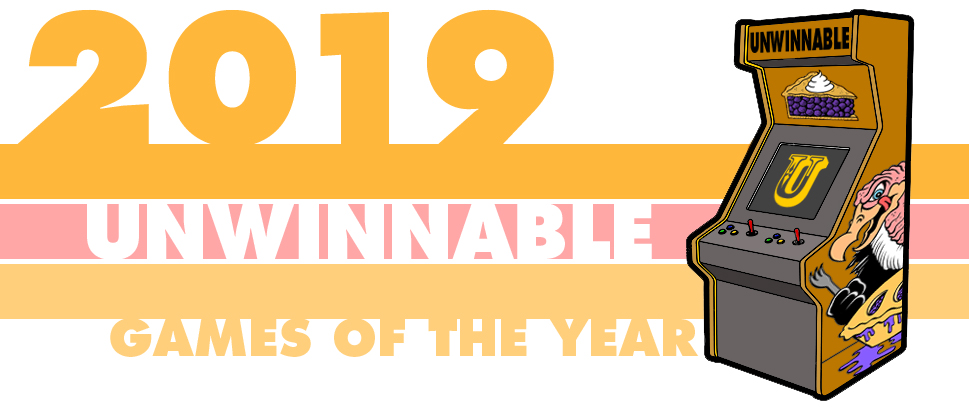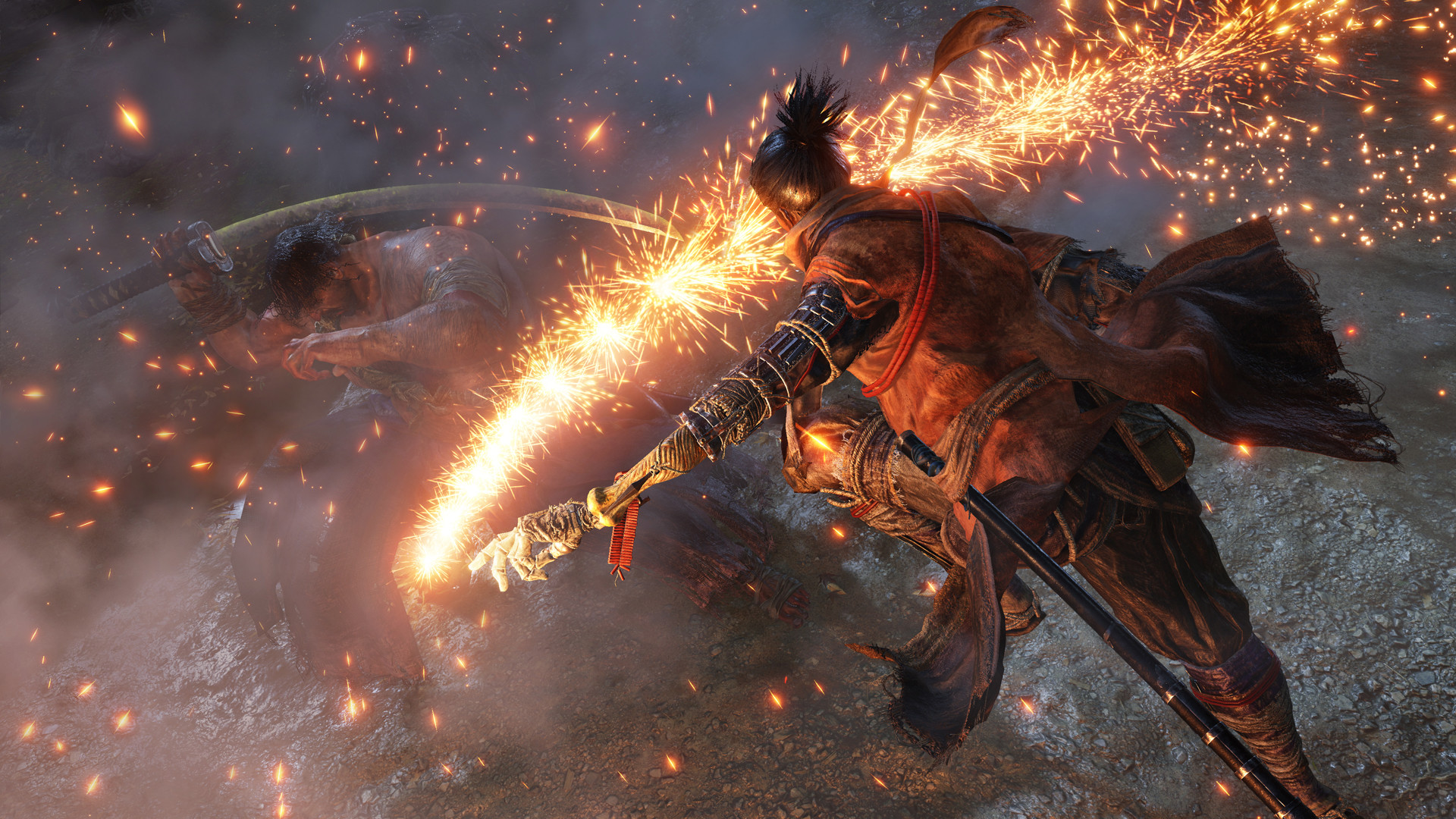
The Best Games of 2019
I’ll get this out of the way first: Unwinnable contributor David Shimomura has so creatively voted for Tiny Islands, under at least ten poorly disguised pseudonyms, that it definitely warrants a special mention: go check out Tiny Islands, because if he loves it that much, it’s probably the cat’s whiskers. The bee’s knees. The kipper’s knickers.
That said, 2019 has been such an explosive geyser of truly brilliant games, that a couple of titles I thought would easily make the list this year seemed to have almost faded into obscurity. It’s a testament to how good videogames continue to be, as well as a crucial reminder of how working conditions for the games industry must also strive to be better. Let merciless work schedules, mandatory crunch, discriminatory work cultures and senseless, massive layoffs be a thing of the past next year. Or bring the salt and pepper, because failing that means we have to start eating the rich.
Without further ado…
– Khee Hoon Chan, Curator

Best Strand Game Award: Death Stranding
Some argue that the marketing machine propelling Death Stranding is still operating at full capacity over a month after its launch. I’m included in that category. And although I can recognize it for the amalgamated mess of pretentiousness and facetiousness that it is, it’s still special and unprecedented in many significant ways, most notably for its indulgence in cinematic framing and its violent abstraction of what constitutes a big-budget game. Whether you like this gorgeous hiking simulator about human connections or not, it’s impossible to deny that it’s experimental, ambitious and affecting in a strikingly sincere way. I’m still sold on it and can see myself returning to it over and over again, perhaps just for a simple trek. For this simplicity begets a quiet sense of beauty, especially when the rugged terrain impeding your path is made traversable by the bridges of complete strangers, intentionally left behind by them to reconnect a broken world for the next pilgrims of melancholy.
– Cian Maher

Best Time Suck Award: Fire Emblem: Three Houses
When I finally got a chance to sit down with Fire Emblem: Three Houses for the first time, I played it for 12 hours straight. That may not have said much about its quality if I was writing this at, say, 16, but at the ripe old age of 27, my time is precious and my sleep even more so. But boring adult responsibilities paled when pitted against one of the most addictive gameplay loops I’ve played in years. While Fire Emblem has always been about shaping up your rag-tag team of soldiers into a formidable army, Three Houses takes that concept to the nth degree in how it tasks you with directing your forces’ teachings from their very first school days onward.
And I continue to tackle my newfound pedagogic duties with an absolute obsession. I finished my first playthrough in a little over a week – basically sinking all waking hours I wasn’t working into my Switch and developing calluses on my thumbs the likes of which I hadn’t seen since…God, the Genesis days, maybe? – only to then immediately start up a new game. Followed by another. And another…
– Alyse Stanley

Best Prison Break Award: Ape Out
“Ape Out translates the chemical, guilty mania of Hotline Miami into a sort of a wholesome, anti-corporate carnage, like breaking Bobby Kotick’s nose with a frozen bunch of fair trade bananas.” I wrote earlier this year, and I still don’t think I can better sum up why Gabe Cuzzillo’s jazz-scored, frenetic, brutally satisfying monkey murder masterpiece is so special. Stuffed with color drenched, impressionist cartoon violence – like a Jackson Pollock guest episode of Itchy and Scratchy – Ape Out manages to be both lean in design and incredibly rich in execution.
Ape Out is an antidote to 2019’s cluttered screens and wiki-fillers. No menu. No UI. No numbers. No power ups or pick-ups or ammo or health bars. Just a big orange ape, reactive jazz samples to underscore every flailing fist and a legion of squishy bastards between you and freedom. In a year that gave us the transcendent bliss of Sayonara Wild Hearts and the balletic intensity of Sekiro, Ape Out remains the most cohesive, confident, energetic and joyful offering I got my huge, hairy paws on.
– Nic Reuben

Best Amnesiac-as-Protagonist Award: Disco Elysium
I can’t recall a game with prose as stirring and mind-expanding as Disco Elysium’s. Not since 80 Days and Kentucky Route Zero have I so feverishly poured over each and every word like a cur to its quarry. Disparate perspectives and realities clash together in the district of Martinaise, where an extant union strike clashes against a murder mystery which you, a drunkard amnesiac, Tabula Rasa disgrace from Precinct 57, must solve with the help of over-competent Lieutenant Kim Kitsuragi from neighboring Precinct 41.
Here is a magical realist odyssey about the economic devils of capitalism and its effects on the fickle mind with all its gnashing of teeth. Who else but developer Studio ZA/UM can so swimmingly paint an image of the way water washes upon the shore, or the direction an abandoned fortress leans, all dilapidated and despondent upon it marooned islet grave? Monuments to time immemorial here are rendered just as if not more important than whodunit. Call it innovative, a game-changer, or what have you. Disco Elysium moved me like no else this year.
– Devin Raposo

Best Game That Takes Place in Space Awards: The Outer Wilds
When we play games, some rules are clearly defined: red barrels are explosive, green items are health and that there are always secrets behind waterfalls. However, sometimes a game presents these same rules, but keeps a few tricks up its sleeve. Outer Wilds is one such title, serving as a puzzle box for players to fiddle with. Take for instance the planets and celestial bodies of Outer Wilds, each with almost similar systems in place – gravity, velocity, inertia, damage – but also with a significant difference. Thus the game is as much about discovering the narrative as it is about figuring out the inner workings of each cosmos.
However the solar system is large, and time is not on your side. In fact, one rule governing Outer Wilds is that you can go anywhere and explore anything, but only within a span of 22 minutes. After that, the sun goes supernova and you are sent back in time to wake up, stare at the stars and watch events unfold before you – time and time again. This use of time is perhaps Outer Wild’s most captivating feature; everything plays out in a specific manner depending on the time. The rotation of planets? The opening of chasms? The closing of passages? All these are also dependent on Outer Wilds‘ clockwork world.
This systematically governed puzzle box of a game further enraptures players through a somber, yet addicting bluegrass soundtrack that brings together the notions of adventure, whimsy, intimacy and solitude. Its story is one of discovery, as it drops proverbial breadcrumbs to more puzzles and intrigue as the player progresses. Every inch of Outer Wilds has clearly been made with careful consideration, with every feature eventually relating and connecting together as a whole. It had me smiling, sighing and crying with every new bit and bob I found.
– Ryan Cooper

Best Game That Made a Lumberjack Giggle Award: Untitled Goose Game
As I prepared for this holiday write-up, I sat down on the couch and booted up Untitled Goose Game one last time in hopes of finding some way to describe its pleasures using mere words. And while I was immediately reminded of its charming cartoon graphics and its sparse soundtrack which, to me, is reminiscent of the jaunty piano music that accompanied an episode of Mr. Rogers’ Neighborhood, the real revelation came when my boyfriend wandered into the room and started watching me play. I don’t think I’ve ever heard that lumberjack of a man giggle before, but the mix of clever puzzles, the perverse “To Do” list designed to make sure that you remember to wreck everyone’s day in the most thorough manner possible and the simultaneously awkward and graceful movement animations of the titular character had him doubled over. This Christmas I will be making sure to pack my Nintendo Switch so that I can share the mischief with my nieces and nephews.
– Megan Condis

Best Game About Losing Control Award: Control
Most of what I want to say about Control has already been said by writers far more eloquent and expressive, but Remedy’s surprise baby deserves all the love it can get. It’s a fantasy for many of us to stumble out of our day-to-day lives into an unearthly new realm, where mundane laws and rules of physics (and reality) simply don’t apply. Turns out this hallowed place is a massive Brutalist bureaucracy. Much has been written about the Brutalist aesthetics that bring Control so beautifully to life – an architectural style hell-bent on achieving immortality. Italian-Brazilian architecture Lina bo Bardi once spoke of her craft as an organism, of structures blending into their environments, and much is the same with Jesse Faden’s experience of assimilating into the Oldest House. Sure, the Oldest House is a testament to the Federal Bureau of Control’s status quo, but the ageless building is constantly shifting. Its bureaucrat occupants, desensitized to change, have formed a neat set of policies and procedures to handle its mysteries. Set amidst the tumult, what does this say about Control – a game about losing control, questioning control, needing control and taking it all back?
At the beginning, Jesse is hungry for information. She needs to know what happened to her brother, what happened in her hometown of Ordinary and what the hell is living inside her head. Stepping into the Oldest House, I’m reminded of a short book by architect Keller Easterling, The Action is the Form: Victor Hugo’s TED Talk, in which she tunnels in on Victor Hugo’s idea that “architecture is information” and how information is embedded in activity. Referring to Hugo’s thoughts on how the invention of the printing press threatened the eternal symbolism of architecture, Easterling writes, “The printed word would usurp architecture as the vessel of cultural imagination and steal its supernatural power: ‘This will kill that. The book will kill the edifice.’”
I’m not sure what Victor Hugo would have made of Control, but I think we’d agree that in many ways, that games have usurped the printed word in codified activity and architecture. The Oldest House is a stand-in for the thousand-headed hydra that Hugo describes as the essence of human thought, the foundation for architecture itself; exploring its wings, discovering its secrets, diving into the pit – these are heavy-handed metaphors for Jesse’s learning and becoming, but they are powerful statements about the Oldest House as a conduit for something great and unquantifiable. Information flows down from the Board. Information is held tightly within each of the Bureau’s numerous Objects of Power, each with distinct protocols and rituals surrounding them. Information is hidden everywhere, and in Jesse’s shoes, playing Control almost becomes like a dance. The beauty of the game lies in relaxing just a little, like looking at a Magic Eye poster, to fall into its rhythms, take pleasure in its flaws, and revel in its power.
– Alexis Ong

Biggest Queer Energy Award: Sayonara Wild Hearts
Sayonara Wild Hearts is queer exuberence personified. As a heroine thrust into an insidious plot to upend the delicate balance of the universe – that’s to say, a crushing heartbreak – you skate, ride, race and leap to waves of intoxicating synthpop, with the game set in neon-soaked cityscapes and kaleidoscopic forests. Rather than a melancholic ride through the different stages of grief, the game exudes incredible energy and confidence instead, having you face off powerful – and dastardly stylish – adversaries as levels warp and contort into different genres from bullet hell to rhythm action. It’s a hell lot of fun, but more importantly, it’s also very empowering and very, very glorious. You don’t have to be queer to enjoy Sayonara Wild Hearts of course, but for queer folks still struggling to accept ourselves, its unabashed celebration of its own identity is a salve for our wounds.
– Khee Hoon Chan

Best Source of Non-Scripted Terror Award: Resident Evil 2
Ever since the remake of the original Resident Evil was announced back in 2002 – oh my god, that’s 17 years ago – I was hoping we’d get a remake of the sequel as well. It didn’t happen. Then Resident Evil 4 came out a few years later, and I thought it would be cool if the “inevitable” Resident Evil 2 remake used a similar third-person perspective that allowed you to aim more precisely. That didn’t happen either. But now here we are 17 years later, and we finally got that remake that I just knew we would have. Eventually. The original remake is now old enough to drive.
It was definitely worth the wait though. Not only does the Resident Evil 2 remake look and play great, it also pay homage and nod to the original in clever ways that feel familiar, but without being direct copies. Plus it’s scary as shit. And it’s not just because Mr. X is stalking you all the time and is drawn to loud noises, like the sounds lesser creatures might make when they spot you, and that of gunfire. It’s also because the monsters you don’t kill, and sometimes just think you have killed, tend to stick around, even when you return to the area after a long time.
Almost all of my favorite moments from playing this game stem from the – I don’t really want to use a cliched term like “organic” but… I guess “bio-organic”? – scenarios these create for the player. Of course you’re always worried about Mr. X, but is that zombie really dead? Did I kill both of the lickers in that hallway or just one? How close are they? Do I have time to walk quietly or should I risk running and making a bunch of noise? How long befor-HOLY SHIT I SWEAR I KILLED THAT ZOMBIE!
– Rob Rich

Best Game Ever, in The Year of our Lord 2019: Sekiro
I love a world that’s both beautiful and dangerous. One filled with rich mystery, dotted with deep holes that invite a curious trespass, with all the deadly adventure implied.
Sekiro offers a world just like this. It’s set in a fictionalized depiction of Japan’s warring era, where, if bandits or samurai don’t gut you, vengeful ghosts will finish the job. Everywhere fires burn endlessly and ash settles on the tile roofs as you dash across them. It’s gorgeous in all its misery and it’s outrageously dangerous too. Your character is frail, tiny next to some of the hulking enemies you must square up against. All you have is a sword and a sense of reflexes that must he honed through endless deaths and rebirths.
Like all souls games, there’s an honesty to these encounters that compels me to bash my head against them, when I might have given up far earlier in another game. I want to excel, to become perfect. In the pursuit of that mastery, I become deeply familiar with the shapes, the movement, the personality of my adversaries. Their mirthless chuckles take root in my memory until I complete their loops, defeat them and move on to the next mountain. All the while, Sekiro reminds me that the cost of my progress is the literal sickness of the people of this world, the entrenchment of its brutality and oppression. It’s a clever bit of self-awareness on the part of the game’s designers, who must realize that much of its player base has the same stubborn streak. It’s a gentle reminder that though we enter the game’s contract willingly, we are not heroes in its story. We are conquerors, exchanging our time and focus for Sekiro’s hard-won treasures. We aren’t here to save its beautiful world, but to plunder it.
– Yussef Cole




